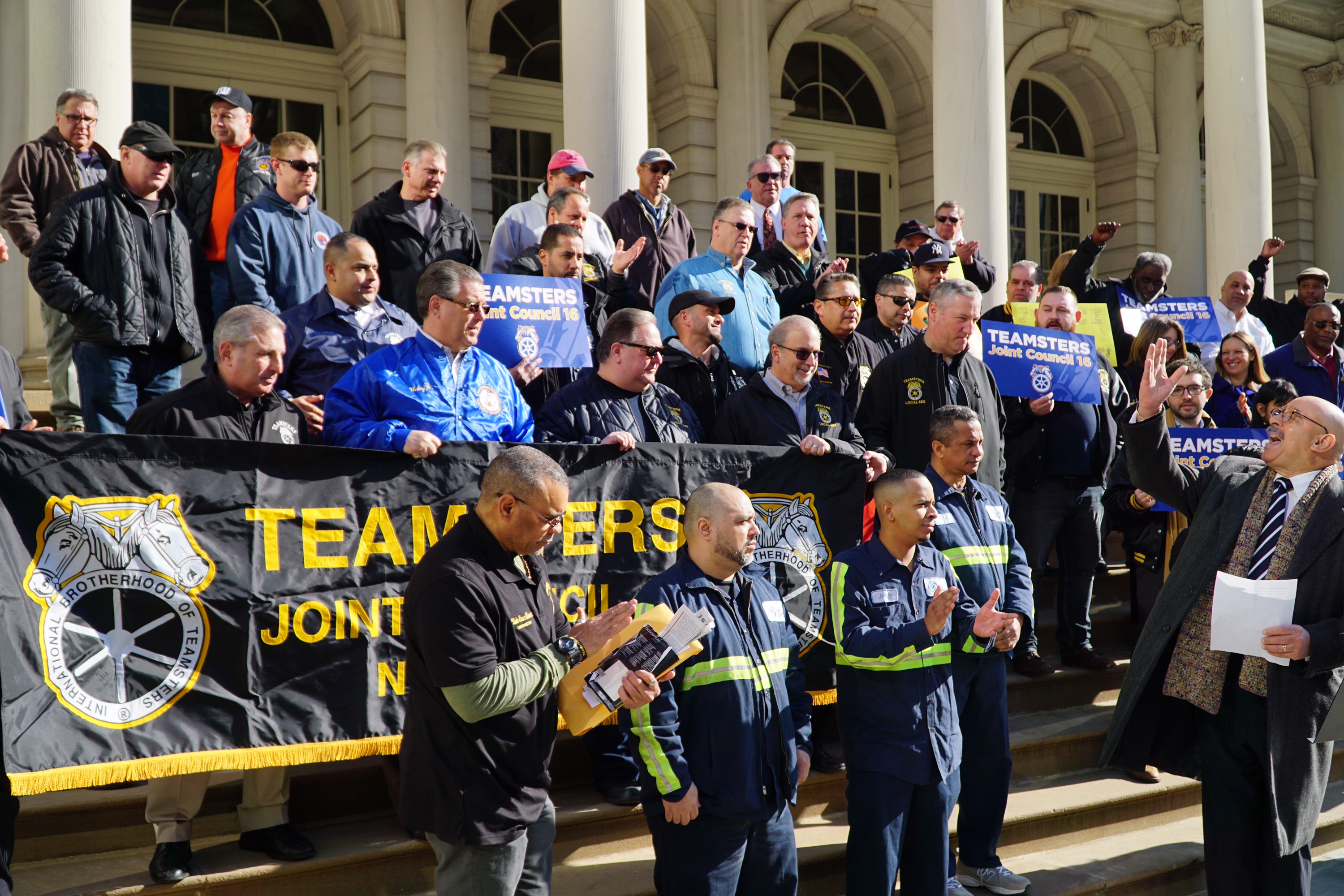
Recycling Workers Rally at City Hall Ahead of Strike
City Council holds hearing on potential strike that would bring chaos to NYC’s residential recycling program
The workers who sort and process all of New York City’s residential recycling rallied at City Hall today as they prepare for a strike as Sims Municipal Recycling. The rally preceded a City Council hearing on the potential strike and what it would mean for New York City’s complex recycling program. The Sims workers are unionizing with Teamsters Local 210 and are calling on Sims to bargain a contract.
“We organized a union to improve our jobs and get respect,” said Jordy Lopez, a Sims worker and leader in the organizing drive. “We have waited for weeks for Sims to recognize our union and bargain a contract, but the company’s only response has been threats and other illegal union busting. A strike was not our first choice, but the company has given us no other option and we will strike to win our union.”
“The 120,000 Teamsters of New York City fully stand behind these brave workers in their fight for justice,” said George Miranda, Secretary-Treasurer of Teamsters Local 210, which already represents Sims workers in a facility in Long Island City. “Going on strike and shutting down the City’s recycling program is our last resort, but we are at the point of last resorts. Sims should see reason and bargain a contract with its workers.”
Sims has a lucrative $1.5 billion contract with New York City to recycle materials collected by the New York City Department of Sanitation. New York City taxpayers invested $80 million in road and utility upgrades to make the facility possible. The company’s contract with the City requires that Sims not have any “labor problems” that “cause or result in strikes, work stoppage, delays.”
The workers informed company management in December that a majority had signed union authorization cards with Teamsters Local 210, but the company refused to bargain a contract. The workers have since filed unfair labor practice charges at the National Labor Relations Board alleging a union-busting campaign by management that included threats and retaliation against union supporters.
“After I voiced my support for a union, I was demoted and was denied the raise I was due,” said Juan Pineda, a Sims worker. “Sims wants everyone at City Hall to think they are a nice, liberal company, but when it comes to our union, they aren’t that different than the Walmarts and McDonald’s of the world. We are here to tell the City Council that we will not be intimidated by Sims and we won’t back down.”
Most of the workers are immigrants, from countries as far apart as the Dominican Republic, Ghana, and Poland, but they have come together around the fight for a union. Over 70% of workers have signed union authorization cards.
“Immigrants all over the country are under attack these days,” said Dwight Martin, a Sims worker from Jamaica. “Forming a union is about building power for workers and protecting ourselves and our families. I am proud to stand with my coworkers and I know we will win.”
“Sims workers have the right to organize and management there must recognize their call for a union contract,” said Council Member Carlos Menchaca, who represents the Sunset Park district where the facility is located. “We will not build an environmentally just city without fair labor practices. New Yorkers do not want their essential recycling services fulfilled by workers who face unacceptable conditions. I have met with the workers at Sims, heard their stories, observed their workplace, and I fully support their efforts.”
The City Council Sanitation Committee hearing, titled “The Potential for a Work Stoppage at Sims Metal Management and its Potential Impact on Residential Recycling” followed the press conference, where workers planned to testify.
A strike at this facility could have major consequences for the City’s residential recycling transport system. “The use of barge and rail transport at the Brooklyn Materials Recovery Facility eliminates 260,000 vehicle miles per year – the equivalent of 150,000 truck trips annually,” commented Eddie Bautista, Executive Director at the New York City Environmental Justice Alliance. “The City cannot risk a work stoppage due to labor protections violations – such an interruption would once again re-route all of the recyclables to the low-income communities and communities of color by truck where waste transfer stations are disproportionately clustered.”
The Sims facility sits at the center of a complex network of barge routes that move materials into and out of the facility. A strike could upend that system, forcing the Department of Sanitation to instead send hundreds of garbage trucks onto neighborhood streets.
